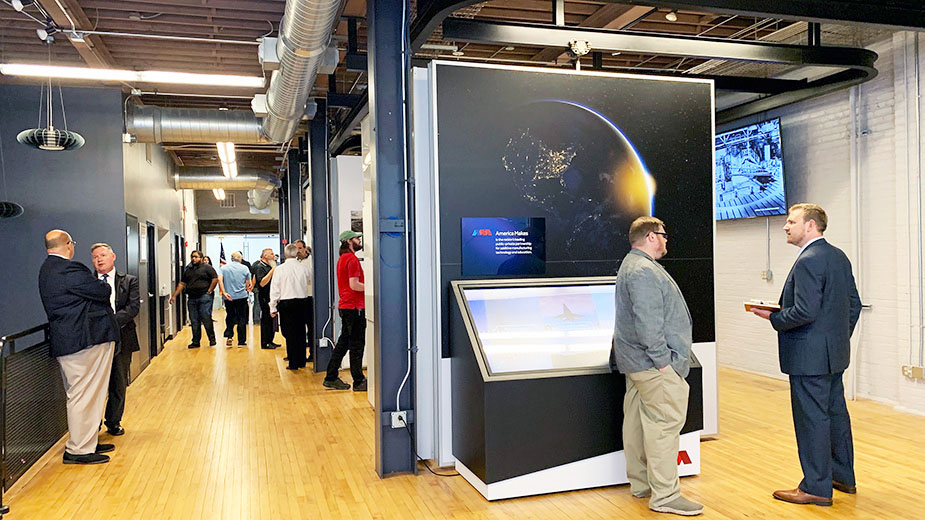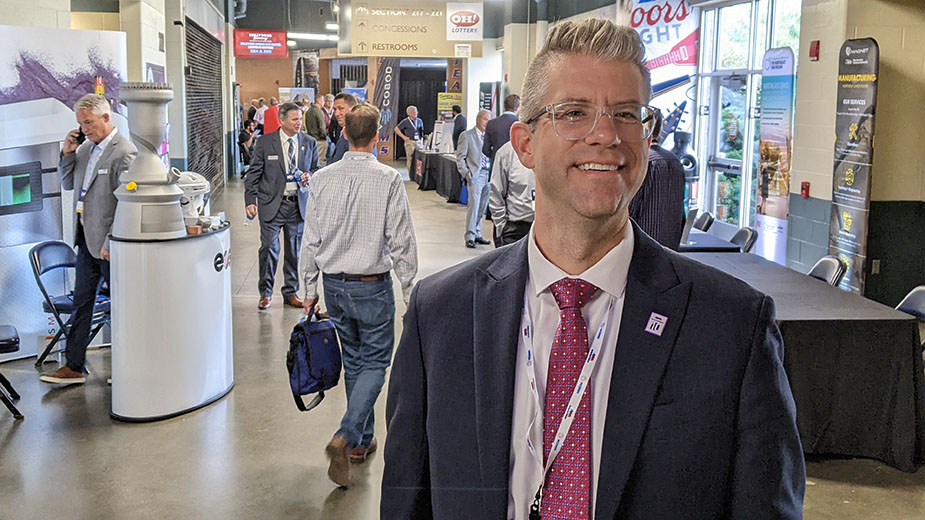YOUNGSTOWN, Ohio – More than 400 representatives from large corporations, small and medium-size businesses, academia and government convened in downtown Youngstown Aug. 18 to advance a single cause: accelerating the use of additive manufacturing among U.S. producers.
America Makes, established 10 years ago as the pilot for the Obama Administration’s Manufacturing USA network, hosted its annual Members Meeting & Exchange conference at the Covelli Centre.
The annual gathering is a vital part of America Makes’ objective to encourage partnerships between private manufacturers, the public sector and other organizations to improve American competitiveness through the use of additive manufacturing, or 3D printing.
“What we’ve heard for 10 years consistently is the most important thing we do is bring people together,” says John Wilczynski, executive director for America Makes. “It’s about the technology. But it’s also about the folks who are trying to take advantage of it and use it.”

Ultimately, this dialogue leads to opportunities for both large, well-known companies such as Lockheed Martin to collaborate with universities, smaller firms and government departments that can tackle complex projects.
The majority of the partnerships forged through America Makes are geared to aerospace and assorted applications with the U.S. Department of Defense.
Kevin Geiss, director, science and technology at the U.S. Air Force Research Laboratory, says that America Makes fits into critical technology priorities established by the Department of Defense to enhance innovation and national security.
“This ecosystem, this partnership, this collaboration that America Makes brings to the table, I think is vital,” he said. These priorities include “seed areas of opportunity” that require development, effective adoption of technologies where there is significant commercial activity, and defense-specific research.
Other key areas include research in hypersonics, advanced materials and space technology, he said.
“What you are engaged in, represented by America Makes, underpins all those core areas,” Geiss says.
He said additive manufacturing would help modernize weapons systems, increase the readiness of the U.S. military and enhance its capabilities. The ability to create components through 3D printing, for example, can reduce assembly time and also support prototyping that fuels innovation.
“Additive systems can potentially reduce the production footprint and improve supply chain and logistics challenges,” he added.
Susan Helper, a senior economist at the White House Council of Economic Advisers, said initiatives such as AM Forward are important to develop new workforce, financing and development programs in additive technology.
“We tend to have separate silos of workforce programs, financing programs, community development programs and it’s up to companies to figure out how to get that together,” she said. “We think the structure of AM Forward will make that easier for companies.”
AM Forward is a private sector initiative that is supported by the Biden Administration. President Biden has said such efforts are meant to help reduce reliance on overseas supply chains and encourage manufacturing in the United States.
Meanwhile, additive manufacturing’s impact on commercial innovation continues to grow.
Kevin Czinger, founder and CEO of Divergent Technologies, based in Los Angeles, said his company has over the last nine years created the “first of its kind” digital manufacturing system for the automotive industry.
The company uses 3D printing technology to produce components for original equipment manufacturers and a sister company, Czinger Vehicles, Czinger said. Currently, Divergent is involved with 20 manufacturing programs.
Aston Martin announced that next month Divergent would produce a 30-kilogram aluminum chassis for its vehicle, according to Czinger.
“This is going to scale up,” he said. “We have volumes in 2025 that are into the 150,000-plus number of vehicles total across all of these programs.”
Divergent uses software technology to design the components along with the OEM. The design is digitally fed into the manufacturing system, in which parts are 3D printed from the ground up.
Initially, the company plans to produce these components from its Los Angeles factory. It then intends to develop one in the United Kingdom and another in Europe. “In 2024, there will be factories in the EU and the U.K. for about a half-dozen different major automotive brands.”
Divergent envisions similar factories in the future to support OEMs all over the world, he said.
Czinger Vehicles, meanwhile, uses Divergent’s manufacturing system to build its sports cars, the 21C and the upcoming 4CGT. The cars are manufactured using artificial intelligence and 3D printing.
Since its inception 10 years ago, America Makes has grown to 236 members, most of which are small-to-mid-size companies, Wilczynski said.
“We as a technology are on the verge of making significant advancements,” he said. “It’s ultimately about getting this technology into the hands of the people. It’s our responsibility to do that.”
Pictured at top: “The most important thing we do is bring people together,” says John Wilczynski, executive director of America Makes.
